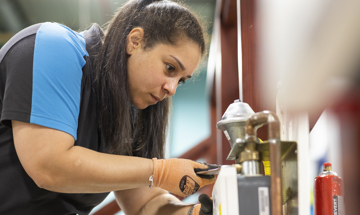-
Number of fuel poor households has more than doubled in past four years, with households needing £232 per year to escape fuel poverty.
-
For every £1 spent by the British Gas Energy Trust in the last financial year, it created £5.50 in value for society.
-
£11 million of gains made for the exchequer through additional tax revenue and savings to the NHS in the last four years.
-
Three-quarters (74%) of beneficiaries reported better satisfaction with their lives after receiving support, compared to just 44% who said the same before help.
British Gas Energy Trust, the independent charitable trust funded solely by British Gas, has created £264 million in societal impact over the past four years, according to new analysis by Oxford Economics.
The report comes as the number of fuel poor households has more than doubled from 4.3 million to 8.9 million between 2020 and 2024 [1]. due to rises in fuel prices and cost of living, with the typical fuel-poor household in England needing £232 per year to escape fuel poverty, compared to £137 in 2020 [2]. The analysis by Oxford Economics found that, at the peak of the crisis, more than two-fifths (41%) reported difficulty in paying their bills during this time. [3]
In response, British Gas Energy Trust has tripled its expenditure, enabled by boosted funding from British Gas, to provide essential support to those who need it most. Since the launch of the Trust in 2004, the energy provider has contributed over £200 million in donations, helping more than 2.2 million people across the UK.
In the past financial year 2023/24, British Gas Energy Trust created £40 million in net benefits to society in England, £7 million in Scotland and £2 million in Wales. The impact of the Trust is seen across the UK, particularly in areas of acute need where people are more likely to be at risk of fuel poverty. Around four in 10 direct grant recipients live in the 20% most deprived areas of the UK with the regions of London, the North West and Yorkshire & the Humber receiving the most support at around £2 million in each region.
The social return on investment (SROI) in the Trust during this time is 5.5. For every £1 spent by the British Gas Energy Trust, it created £5.50 in value for society – more than double that of the previous report undertaken by Oxford Economics which was 2.4 for the financial year 2014/15. When breaking down the impact of each of the Trust’s programmes, the scheme which provides grants to support-focused organisations saw the highest SROI at £6.50.
"We had a clear goal for the Trust when it was set up 20 years ago – to alleviate the detrimental impact of fuel poverty."
Jessica Taplin CEO, British Gas Energy Trust
Looking at the Trust’s broader economic benefits to society in the last four years, £11 million of additional gains has been made for the exchequer through additional tax revenue and savings to the NHS by alleviating pressures which negatively impact people’s wellbeing.
Amongst beneficiaries of British Gas Energy Trust, nearly three-quarters (74%) said they felt satisfied with their lives after receiving the support and guidance, compared with just 44% who said the same before receiving support. In addition, nearly two-thirds (65%) said they felt less stressed, while more than three-quarters (77%) agreed that they felt more financially stable.
The purpose of the British Gas Energy Trust is to alleviate the detrimental impact of fuel poverty through three main programmes. This includes:
- Direct grants programme, helping people to clear fuel debt arrears;
- Financial Assistance Payments (FAP) programme, offering fuel vouchers directly to individuals and families;
- and the Supporting Communities at Risk Programme (SCARP) which funds charity advice agencies across Britain who provide holistic money and energy advice to individuals who have been disproportionately impacted by fuel poverty. This includes those with additional needs such as electrical medical health requirements or disabilities
Jessica Taplin CEO of British Gas Energy Trust, said: “The dual crisis of rising energy costs and wider cost of living increases continues to have a devastating impact on households. We had a clear goal for the Trust when it was set up 20 years ago – to alleviate the detrimental impact of fuel poverty. With the support of our grant and funded organisation programmes, this new report brings home the positive impact we’ve made so far – but it doesn’t end there.
“Our fight to help people in fuel poverty continues and this year to mark our 20th anniversary, we’re building on our understanding of the issue from the front line, by visiting charities and third sector organisations who support those most at risk of fuel poverty, and hearing from people affected, to take stock on what really helps and the barriers we still need to overcome. The aim is to identify and fund future interventions that are proven to support the most vulnerable communities while gathering meaningful lessons to influence societal change and see significant reductions in fuel poverty over the next decade.”
Chris O’Shea, Chief Executive of Centrica, said: “The impact that the British Gas Energy Trust has had has been phenomenal. Not only is it reaching people in some of the most deprived areas across the country, it is also positively impacting people’s lives, supporting them with financial aid and guidance in their time of need.
“While it’s been good news that food and energy prices are falling, for many households the cost-of-living crisis is far from over. That’s why we’ve put £140 million into supporting those who need help the most. We will be continuing to work closely with the Trust to ensure that this work continues and to help alleviate the pressures so many are facing – now and in the future.”
Chris Warner, Lead Economist at Oxford Economics, said: “The report underscores the efficacy of interventions targeting fuel poverty to create social value and demonstrates the profound effect of British Gas Energy Trust’s programmes on its beneficiaries’ sense of wellbeing. Ultimately, it showcases why charities such as the Trust should collect comprehensive yet proportionate data on their beneficiaries in order to understand and communicate their impact.”
In the upcoming months, British Gas Energy Trust is hosting a series of roundtables throughout the year in some of the UK’s deprived areas with its funded organisations to gather insights to help drive further systemic change to reduce fuel poverty. The locations include, London (Bromley-by-Bow), Glasgow, Doncaster, Newcastle, Bristol, Cardiff, and Leicester.
Read the full report here
To find out more to apply for financial grants or support from the British Gas Energy Trust, visit: https://britishgasenergytrust.org.uk/who-can-apply/
Notes to editors
[1] Fuel expenditure of more than 10% of income after housing costs is used as the definition of fuel poverty. Data from Department for Energy Security and Net Zero, “Annual Fuel Poverty Statistics in England, 2024 (2023 data)”, accessed March 2024.
[2] Department for Energy Security and Net Zero, “Fuel poverty trends 2024”, accessed March 2024
[3] Office for National Statistics, “Public opinions and social trends, Great Britain: 17th to 28 January 2024”, accessed February 2024.
About Oxford Economics methodology:
The report uses social return on investment analysis to quantify the social value created by British Gas Energy Trust. In alignment with the Trust’s aim to enhance the wellbeing of its beneficiaries, Oxford Economics used a wellbeing-centric approach to quantify its social value.
The research draws on survey and administrative data collected on behalf of the Trust, as well as a range of secondary sources to measure the wellbeing impact of its programmes. To convert these wellbeing impacts into monetary equivalents, the report uses a recognised methodology.
Oxford Economics also assessed the wider economic impact of improvements in individuals’ wellbeing, which consisted of exchequer gains from NHS savings, increased income tax and national insurance contributions.
About British Gas Energy Trust
The British Gas Energy Trust is a Charitable Trust established in 2004 and independent from, but solely funded by, British Gas. Its mission is to alleviate the detrimental impact of poverty, with a focus on fuel poverty. Support is delivered through three programmes: debt relief grants which can help households with up to £2,000 in fuel debt; a small grants programme that provides emergency energy vouchers and payments; and a programme that funds over 40 money and energy advice projects throughout Britain.
About Oxford EconomicsOxford Economics was founded in 1981 as a commercial venture with Oxford University’s business college to provide economic forecasting and modelling to UK companies and financial institutions expanding abroad. Since then, we have become one of the world’s foremost independent global advisory firms, providing reports, forecasts, and analytical tools on more than 200 countries, 100 industries, and 8,000 cities and regions. Our best-in-class global economic and industry models and analytical tools give us an unparalleled ability to forecast external market trends and assess their economic, social, and business impact.

News
British Gas boosts workforce with over 400 apprenticeship roles
Our people

News
Team GB and ParalympicsGB Athletes Find New Career Pathway at Centrica
Our people

News
British Gas to Boost its Workforce with 300 New Apprentices
Our people

News
Centrica named one of The Times Top 50 Employers for Gender Equality 2024
Our people

News
Centrica strengthens leadership team with two new senior hires
Our people

News
Centrica puts people at the heart of its levelling up work
Our people
